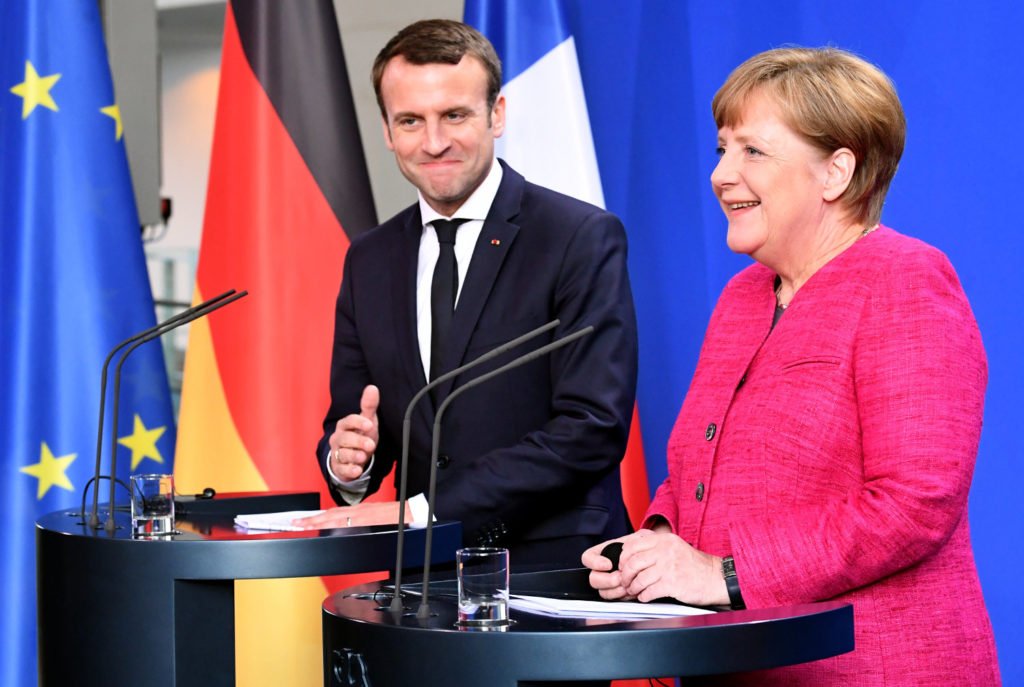Franco-German Treaty of Aachen? Know everything you need

Image: The Local France
Aachen Treaty or Franco-German Treaty on Cooperation and Integration is a further sign of the alliance between Europe’s economic and political powerhouses. It is signed 56 years after Chancellor Konrad Adenauer and President Charles de Gaulle signed the Elysee Treaty in Paris. It sets out an alliance in broad terms.
What the 16 pages of Aachen Treaty says:
Security: The two countries will “deepen their cooperation in foreign policy and internal and external defense.”
They commit to “providing assistance and aid by all means at their disposal, including armed forces, in case of aggression against their territory.”
Also, a Franco-German Defence and Security Council would be established as the political body governing these reciprocal engagements. The aim, Merkel said, is to build a “common military culture” that “contributes to the idea of the creation of an European army.”
Diplomacy: The admission of Germany “as a permanent member” of the United Nations Security Council is “a priority of Franco-German diplomacy.” The two countries will coordinate their positions within the UN and facilitate EU “unified positions” within the UN frameworks.
Cross-border relations: The treaty also provides for “closer links between citizens and businesses on both sides of the border” with “accelerated procedures” to advance projects and a “cross-border cooperation committee” made up of states, communities and parliaments.
The aim of “bilingualism” (French and German) in cross-border areas is confirmed without any change in “administrative languages.”
Economy and climate: The two states set a common objective of “setting up a Franco-German economic zone with common rules” and setting a priority for the “harmonization of business laws.”
The two countries are to set up a “Franco-German council of economic experts” made up of 10 independent members responsible for making “recommendations for economic action.”
A “Citizens Fund” is to be established that would support city-level partnerships and cross-border initiatives ranging from bilingual child care centres to public transport links.
Language: Berlin and Paris also want to bring their education systems together through “the development of mutual learning of each other’s language.”
Berlin and Paris promise “joint projects” in energy, renewable energy and energy efficiency.
Institutional cooperation: A multi-year program of projects ranging from the re-conversion of the Fessenheim nuclear power plant to a Franco-German digital platform and cooperation on Artificial Intelligence (AI).
The treaty also proposes to formalize a previously exceptional practice: once a quarter, a member of each government executive will participate in the council of ministers of the other state.
Myths and facts around the treaty
As part of their political campaigns ahead of the European Parliament elections in May, extremists in both countries seized on conspiracy theories about the treaty.
One of the French presidential candidates Marine Le Pen of “National Rally” accused Macron of an “act that borders on treason.”

She also posted a video endorsing her views that the cross-border cooperation would “place Alsace under the tutelage of Germany.” Euroskeptic MEP Bernard Monot claimed that Macron’s true aim was to deliver “Alsace and Lothringen, Judas-like, to the foreign powers.”
However, “euro-districts” across the border have existed for many years, such as the Strasbourg-Ortenau district set up nine years ago as an area to facilitate: “Appropriate skills, dedicated resources and accelerated procedures to overcome obstacles to economic, social, environmental, health, energy and transport services.”
Nicolas Dupont-Aignan of “France Arise” (DLF) termed it a treaty of “Submission … We put ourselves in the hands of German chancellor Merkel.” Alexander Gauland, leader of the far-right Alternative for Germany (AfD), said Paris and Berlin were seeking to create a “super EU” within the European Union.
He also said “We as populists insist that one first takes care of one’s own country. But we don’t want Macron to renovate his country with German money”.
There is no mention of sovereignty in any part of the treaty.
Yet Article 3 of the treaty is explicit and concise which says: “The two states deepen their cooperation on foreign policy, defence, external and internal security while reinforcing Europe’s capacity for independent action.”
*Akshat Verma is European and African correspondent The Kootneeti


















